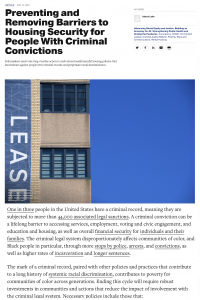Preventing and Removing Barriers to Housing Security for People With Criminal Convictions
Jaboa Lake, Center for American Progress
As this brief discusses, one in three people in the United States have a criminal record, meaning they are subjected to more than 44,000 associated legal sanctions. A criminal conviction, the author asserts, can be a lifelong barrier to accessing services, employment, voting and civic engagement, and education and housing, as well as overall financial security for individuals and their families. The author furthers, the criminal legal system disproportionately affects communities of color, and Black people in particular, through more stops by police, arrests, and convictions, as well as higher rates of incarceration and longer sentences.
The mark of a criminal record, paired with other policies and practices that contribute to a long history of systemic racial discrimination, the author argues, contributes to poverty for communities of color across generations. This brief asserts that ending this cycle will require robust investments in communities and actions that reduce the impact of involvement with the criminal legal system and outlines several policies that (1) end hypercriminalization and overpolicing, (2) invest in affordable housing and the social safety net, (3) automate criminal record clearing and expungement, and (4) eliminate the collateral consequences of criminal records.
